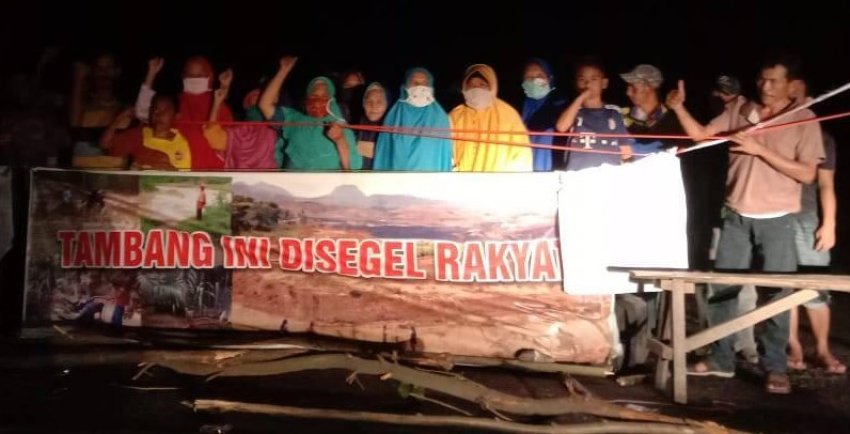
The Indonesian government relies heavily on coal mining to generate revenue. It is the country’s largest export commodity, creating about 15% of total export values. In addition, 60% of electricity generated in Indonesia comes from coal-fired power plants.
The dominance of coal as a fuel is supported by conflicting interests of government officials with close ties to the coal mining industry.
For example, Luhut Binsar Panjaitan served as the minister for maritime and investment, while owning shares in the PT Toba Sejahtera Group. Its subsidiaries include coal mining companies, such as PT Toba Bara Sejahtera Tbk, PT Admira Baratama Nusantara, PT Indomining, PT Trisensa Mineral Utama and PT Kutai Energi, operating in East Kalimantan.
Erick Thohir, the minister for state-owned enterprises has a close relationship with coal mining company PT Adaro Energy Tbk — the second-largest producer of coal in Indonesia and the fourth-largest in the world.
Following pressure from large players in the coal industry, the Indonesian government reviewed and amended laws governing coal mining in May. The new law allows any company holding a Coal Mining Company Works Agreement (Perjanjian Karya Pengusahaan Pertambangan Batubara, PKP2B) to have its mining contract extended automatically after it expires.
In the next five years, PKP2B contracts held by seven large coal mining companies are due to expire (see table below). Altogether, these companies are contracted to extract about 203 million tonnes of coal per year for export on 3817 square kilometres of land (more than five times the size of Jakarta).
274 Indonesian PKP2B coal contracts expiring next 5 years.JPG

Even as the international trend is to reduce coal use, Indonesia provides huge opportunities and facilities for companies through the new Minerals and Coal Mining Law to extend PKP2B contracts permitting companies to continue to mine up to about 35% of the total national coal quota per year. This translates to 206 million tonnes per year for 20 years, or 30 years if the coal mine has a power plant attached.
The new law also transfers the authority to grant mining permits from provincial governments to the central government.
This new law overturns the requirement for PKP2B mining companies to return all mining land to the state to become national reserves when their contracts end. Under the previous law, if the land is to be reused in the future, it must first be auctioned to state-owned enterprises, before being offered to domestic private parties, or the foreign private sector – and limited to 15,000 square kilometres.
In addition, the previous law allowed river mining over 0.25 square kilometres of land, while the new law raises this to 1 square kilometre, which will worsen the damage to river ecosystems.
The new law also legalises the actions of mining companies that fail to fill in disused mining pits. Previously, every mining company was required to do so, as these pits are dangerous if left open. People have died from drowning in some parts of the country as a result.
These pits also contaminate sources of clean water in communities. Affected residents are forced to use water from ex-mining pits, which endanger health and cause flooding during the rainy season.
274 Coal mining in East Kalimantan cr Pius Ginting Coordinator AEER Aksi Ekologi & Emansipasi Rakyat..jpg

The changes to the mining laws are providing more protection to mining companies at the expense of people. Communities no longer have the right to refuse entry to companies holding mining permits. If people protest, they can be sentenced to prison or given a fine. People considered to be interfering with mining activities can now be required to pay compensation to the company.
Many people have expressed their opposition to the new mining laws since they were first discussed in parliament. Civil society activists, such as students, workers, affected communities and NGOs staged demonstrations in September against the revision plan.
Protests resulted in parliament postponing the ratification of the new laws to reduce the rising wave of opposition. Although the vote was delayed for eight months, debate continued in secret during the COVID-19 pandemic, while people followed health protocols not to gather in groups or leave the house freely.
After the law was secretly debated on May 12 and ratified, NGOs and experts held an online meeting of mining-affected peoples from the islands of Sumatra, Kalimantan, Sulawesi, Papua, and Java including Kendeng Mountain, where residents have long opposed a cement company operating in their territory.
Environmental activists argued that the review process that resulted in the new law was defective. The drafting was not carried out in a participatory manner and it comprehensively ignored the problems faced by the people, especially environmental and safety impacts.
A People's Assembly against the ratification of the new mining law was held between May 29 and June 1, through online discussion and broadcast via 25 social media channels (including Facebook, Instagram and YouTube) with speakers from various organisations and witnessed by 200,000 Indonesians via live streaming.
The Assembly resolved that: the Parliamentary session on May 12 was corrupted, as it did not have a quorum; the process amounted to cheating, as it exploited the COVID-19 pandemic situation; the decision should be declared null and void in the name of popular sovereignty and for the sake of safety; all contracts, agreements and permits issued under this law are null and void; the people’s right to veto and to declare and refuse mining activities on their land should be returned; and the government should recover the losses experienced by the people and environmental damage because of mining activities so far.
Mine-affected communities and activists now have the option to test the new law in the Constitutional Court.
[Pius Ginting is an activist with Action for Ecology and People’s Emancipation (AEER) in Indonesia.]
274 Lahat protest against mining in South Sumatra cr Anak Padi cropped.jpg
